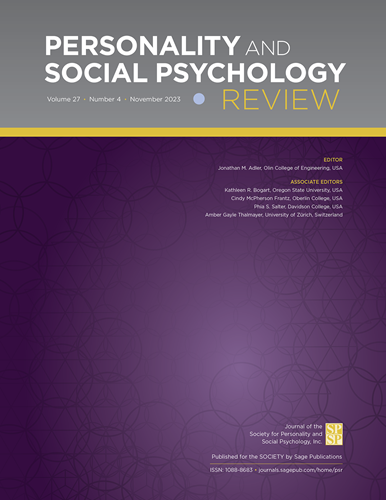Mino-Bimaadiziwin and the Pursuit of Harmony.
IF 10.4
1区 心理学
Q1 PSYCHOLOGY, SOCIAL
引用次数: 0
Abstract
Academic AbstractTheories of well-being are heavily influenced by Western viewpoints; even when Majority World perspectives are incorporated, psychologists often fail to consider the rich cultural knowledge of the Indigenous peoples of North America. We propose that personality and social psychologists engage in "deep learning" (without appropriation or colonization) of a Native American Majority World perspective on well-being. We present a description of the "storywork" surrounding the concept of Mino-Bimaadiziwin, translated as "the good life" or "living in a good way," emerging for the Anishinaabeg, who are Indigenous peoples consisting of the Ojibwe (Chippewa), Potawatomi, Algonquin, Saulteaux, Nipissing, and Mississauga First Nations. We discuss the Gichi-dibaakonigewinan, The Seven Grandfather Teachings, that emerge to promote well-being, which is inherently relational and concerns harmony in contrast to happiness. Gichi-dibaakonigewinan are composed of seven virtues-Truth, Humility, Respect, Love, Bravery, Integrity, and Wisdom-whose consideration reveals pathways to well-being possible in Majority World Contexts that psychologists should consider.Public AbstractWhat is the good life, or living in a good way? Western psychology, rooted in Western philosophy, has sought to study this very question. However, researchers have not considered the perspective of the Majority World. In this paper, we present how the Anishinaabeg, who are Indigenous peoples consisting of the Ojibwe (Chippewa), Potawatomi, Algonquin, Saulteaux, Nipissing, and Mississauga First Nations, think about the good life, or Mino-Bimaadiziwin. Mino-Bimaadiziwin is characterized by the pursuit of harmony in contrast to happiness. We discuss the Gichi-dibaakonigewinan, The Seven Grandfather Teachings, that promote well-being. These Seven Grandfather Teachings are composed of seven virtues, each typified by an animal-the turtle for Truth, wolf for Humility, buffalo for Respect, eagle for Love, Bear for Courage, Raven for Integrity, and Beaver for Wisdom-whose consideration reveals pathways to well-being possible in Majority World Contexts psychologists should consider.米诺-比马迪奇温与对和谐的追求。
摘要幸福理论深受西方观点的影响;即使把多数世界的观点考虑在内,心理学家也常常没有考虑到北美土著人民丰富的文化知识。我们建议人格和社会心理学家参与“深度学习”(没有挪用或殖民)美洲原住民占多数的世界对幸福的看法。我们呈现了围绕Mino-Bimaadiziwin概念的“故事作品”描述,翻译为“美好生活”或“以良好的方式生活”,出现在Anishinaabeg,他们是由Ojibwe (Chippewa), Potawatomi, Algonquin, Saulteaux, Nipissing和Mississauga第一民族组成的土著民族。我们讨论了Gichi-dibaakonigewinan,即七种祖父教义,它们的出现是为了促进幸福,这是内在的关系,关注的是与幸福相反的和谐。Gichi-dibaakonigewinan由七种美德组成——真理、谦卑、尊重、爱、勇敢、正直和智慧——对它们的思考揭示了在大多数世界背景下通往幸福的可能途径,心理学家应该考虑。【公众文摘】什么是美好的生活,或者以一种美好的方式生活?植根于西方哲学的西方心理学试图研究这个问题。然而,研究人员并没有考虑到多数世界的观点。在本文中,我们展示了由Ojibwe (Chippewa), Potawatomi, Algonquin, Saulteaux, Nipissing和Mississauga First Nations组成的土著民族Anishinaabeg是如何思考美好生活的,或称Mino-Bimaadiziwin。Mino-Bimaadiziwin的特点是追求和谐而不是幸福。我们讨论了促进幸福的七祖教法Gichi-dibaakonigewinan。这七项祖传教诲由七种美德组成,每一种美德都由一种动物代表——乌龟代表真理,狼代表谦卑,水牛代表尊重,鹰代表爱,熊代表勇气,乌鸦代表正直,海狸代表智慧——它们的考虑揭示了在大多数世界背景下可能通往幸福的途径,心理学家应该考虑。
本文章由计算机程序翻译,如有差异,请以英文原文为准。
求助全文
约1分钟内获得全文
求助全文
来源期刊

Personality and Social Psychology Review
PSYCHOLOGY, SOCIAL-
CiteScore
19.00
自引率
1.90%
发文量
20
期刊介绍:
Title: Personality and Social Psychology Review (PSPR)
Journal Overview:
Official journal of SPSP, the Society for Personality and Social Psychology, Inc.
Premiere outlet for original theoretical papers and conceptual review articles in all areas of personality and social psychology
Features stimulating conceptual pieces identifying new research directions and comprehensive review papers providing integrative frameworks for existing theory and research programs
Topics Covered:
Attitudes and Social Cognition: Examines the inner workings of the human mind in understanding, evaluating, and responding to the social environment
Interpersonal and Group Processes: Explores patterns of interaction and interdependence characterizing everyday human functioning
Intergroup Relations: Investigates determinants of prejudice, conflict, cooperation, and harmonious relationships between social groups
Personality and Individual Differences: Focuses on causes, assessment, structures, and processes giving rise to human variation
Biological and Cultural Influences: Studies the biological and cultural mediation of social psychological and personality processes
 求助内容:
求助内容: 应助结果提醒方式:
应助结果提醒方式:


